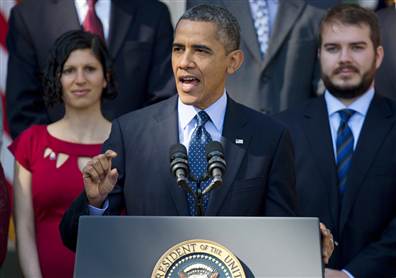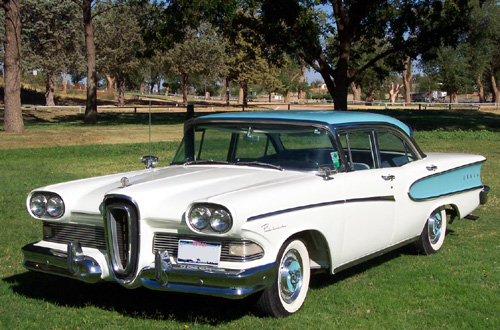Edsel. Buckner. Ishtar. And Obamacare?
The Ford Motor Company introduced a new model with great fanfare in 1958: The Ford Edsel. It was a spectacular failure and was pulled from the market within three years. The dud cost the car manufacturer a whopping $350 million—more than $2 billion in today’s dollars.
Red Sox fans watched in horror in 1986 as their first baseman, Bill Buckner, allowed a ball to dribble through his legs. His error cost Boston the World Series title.
Movie executives probably thought a Warren Beatty-Dustin Hoffman comedy was a sure winner. But 1987’s “Ishtar” became one of film’s most notorious flops, barely grossing $14 million against a $55 million budget.
Today, all three of those words—”Edsel,” “Buckner,” and “Ishtar”—stand as single-word reminders of spectacular failures. The question now facing the Obama administration is whether the term “Obamacare” will join their ranks, not in reference to the policy itself, but rather to its botched rollout.
President Obama, aware of the poor rollout’s seriousness and the resulting threat to his namesake legislation, addressed the nation this morning from the White House Rose Garden.
He directly addressed the problems with Healthcare.gov, the website on which people were supposed to have been able to purchase their health insurance at the beginning of this month but which has been plagued with major technological problems. As a result, many people—some estimates suggest hundreds of thousands—have been unable to complete their applications.
From a crisis management perspective, he succeeded only partially. His upbeat message, which sought to put the website’s failure into a larger perspective, will provide some balance to the news coverage he receives.
But the event itself played more like a political rally, complete with “real people” standing behind Mr. Obama as he spoke. Instead of focusing primarily on the website’s dismal performance and his administration’s plan to fix it, he spent the majority of the event touting the Affordable Care Act’s virtues. Those virtues are an important part of the story, yes, but must be paired with credible information about what health insurance shoppers can reasonably expect, and when.
Even after the presidential speech, we still don’t know: How many people have successfully gotten health insurance through the online exchanges? How many have tried and failed? Will the exchanges have enough people in the insurance pool to make them work? When will insurance companies get accurate information about enrollees? And critically, when will the new system be up and running?
By failing to address those basic questions, viewers were left with an unmistakable impression that the numbers are bad—and that the administration doesn’t have a good idea when the website will be at full speed.
Given that, here’s the question: Based on its poor rollout, will the term “Obamacare” eventually become another term to symbolize failure, alongside the Edsel, Buckner, and Ishtar? Perhaps a more fitting analogy will prove to be Broadway’s Spiderman, which was plagued by poor reviews, cast injuries, and set problems—which led to the longest preview period in Broadway history—but is now heading toward profitability and commercial success.
Note: This analysis extends solely to the implementation of the Affordable Care Act, and does not comment on the merits of the policy itself.
Don’t miss a thing! Click here to instantly join our mailing list and receive our 21 most essential media training tips.





Brad —
You said “Red Sox fans watched in horror in 1986 as their first basement, Bill Buckner, allowed a ball to dribble through his legs. His error cost Boston the World Series title.”
But I imagine he was the first baseman and not playing in the basement. Spell check only works sometimes.
Best,
Richard
Richard,
I corrected the typo. Thank you for pointing it out.
Best,
Brad
Wide right!
I doubt it: there’s a lot more to Obamacare than healthcare.gov, and it will be around long after the website gets fixed. On the other hand, “New Coke” still means the botched launch of new Coke, even though new Coke itself is still around and doing quite well.
I question whether the president should have addressed the website at all. If asked in a press conference, then yes, he could say, “The website will be fixed by x date – we have the best people in the industry working on it now.” No need to call an event to point out how poorly things are going, especially when coming off a major “win” regarding the government shut down. In his chosen course of action, he was able to “snatch defeat from the jaws of victory” from a communications perspective.